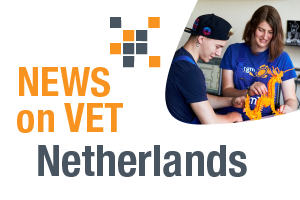Basic skills in Dutch VET
Apart from preparing VET students for professional practice, the aim of Dutch VET is to prepare its students for a lifelong learning culture in terms of reaching and maintaining adequate proficiency levels in Dutch, maths and digital skills. Its purpose is also to prepare them for active participation in society. This refers to citizenship education, defined as insight into various aspects of society: healthy living, understanding social and cultural diversity, political decision-making, and functioning of the labour market.
Concerns about the current proficiency levels in basic skills
The Minister for Education addressed in a letter to the Parliament in July 2023 concerns about the basic skill levels in VET as a reason for announcing additional measures. The letter explains that many VET students are unable to reach the desired levels in the Dutch language and maths. Latest results of the PISA research among 15-year-olds show that the deterioration in maths, and even more in literacy skills, is a general trend at all education sectors in the Netherlands. But the decline in literacy skills is higher among pupils in preparatory VET programmes. This overall decrease in basic skills is worrying, as people with insufficient basic skills are at greater risk of unemployment and low income, facing a barrier to equal opportunities, as shown by the Dutch Court of Audit in 2016. The minister also highlighted the importance of basic skills for professional practice. For example, a nurse must be able to determine correct dosages of medication and installers must be able to perform calculations.
Current VET regulations offer little room to integrate Dutch language and maths into occupational learning. This is, according to the Dutch Education Council (2022), one of the reasons for the low levels in the aforementioned basic skills. Integrating basic skills training into occupational learning would appeal to and help many VET students.
Citizenship education is also in need of improvement. Participation in society means that VET students are able to function effectively in socioeconomic and political contexts as well, based on their well-developed civic, social and self-healthcare skills. However, recent research on teachers of basic skills and citizenship education shows that currently not all aspects of citizenship education are addressed in VET. In fact, many VET schools fail to pay sufficient attention to citizenship as a subject, partly because qualification requirements for citizenship education are broadly defined to allow VET schools to give their own interpretation of what should be the core of citizenship education. Moreover, citizenship as a subject is not examined to prevent the subject from being reduced only to learning facts. The downside is this great diversity in form, content, vision and policy regarding citizenship education. The researchers conclude that the current qualification requirements for citizenship are non-committal.
New initiatives
The Minister for Education has also taken further initiative and intents to support VET students graduating at a defined minimum level (2F) in Dutch language and maths and an adequate proficiency level in citizenship.
In the same letter to the Parliament from July 2023, the minister proposes three types of action to improve the basic skill levels of VET students in the Dutch language and maths; (a) raising the quality of education and examinations, (b) investing in the competences of VET teachers, and (c) monitoring students’ proficiency levels. These action types are to be further worked out in close cooperation between the government and the VET schools.
The minister’s proposals for citizenship education contradict the former approach by introducing school-based exams following the 20 qualification requirements suggested by an expert group, clustered into four themes:
- differences and equality. This theme starts with the idea that many kinds of differences exist between groups in society, for example based on gender or social class. It includes the potential tension between room for plurality and equality for all groups;
- individuals and groups. This theme concentrates on the interests of individuals and groups, different visions and ideals, potential tension between them and various ways to advocate for these interests;
- perspectives on society and social issues. Here students develop the ability to recognise social issues and the different views that exist on how these issues can be dealt with through government policy;
- power and decision-making. Students are able to recognise how processes of decision-making take place and how power and interests influence these processes.
Qualification requirements for citizenship education could be described in more detail but they should not prescribe how students think – opinions are not to be assessed. However, the awareness of social values creates obligations. The solution to these contradictory approaches is to distinguish between curricular assignments for secondary VET, laid down in qualification requirements, and the pedagogical assignment for VET schools to disseminate, demonstrate and stimulate adherence to democratic values and attitudes. Schools are 'mini societies' in which students can practise citizenship and diversity, and exercise power and democracy.
Read more
- Eindrapportage Professionele achtergrond van mbo-docenten basisvaardigheden en burgerschap | Rapport | Rijksoverheid.nl [Final report on professional background of VET teachers of basic skills and citizenship education | Report | National government]
- Kaderbrief aanpak basisvaardigheden mbo [Framework letter to parliament on the approach on basic skills in VET]
- Burgerschapsonderwijs in een veranderende samenleving | Rapport | Rijksoverheid.nl [Citizenship education in a changing society | Report | National government]
- Taal en rekenen in het vizier | Advies | Onderwijsraad [Language and Math in focus | Advice | Education Council]
- Aanpak van laaggeletterdheid | Rapport | Algemene Rekenkamer [Tackling low literacy levels | Report | Court of Audit]
- PISA Netherlands – Programme for International Student Assessment (pisa-nederland.nl)
|
Please cite this news item as: ReferNet Netherlands; Cedefop (2023). Netherlands: how to equip VET students with the adequate basic skills to participate in society successfully. National news on VET |
